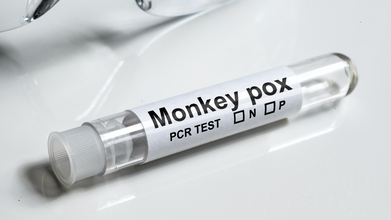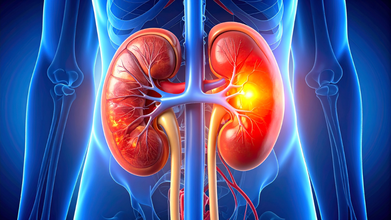- Health Conditions A-Z
- Health & Wellness
- Nutrition
- Fitness
- Health News
- Ayurveda
- Videos
- Medicine A-Z
- Parenting
Is Diarrhea A Symptom Of The Flu?

When you think of the flu, symptoms like fever, fatigue, muscle aches, and a persistent cough likely come to mind. However, if you’ve experienced diarrhea along with your flu-like symptoms, you may be wondering whether the flu is responsible for your stomach upset or if you’ve contracted another illness altogether. While the flu is primarily a respiratory infection, diarrhea can sometimes be a symptom—especially in children. Understanding why this happens and how to manage flu-related diarrhea can help you recover more comfortably.
Influenza is a viral infection that primarily affects the respiratory system, but in some cases, it can also impact the digestive tract. This is more common in children, particularly those infected with influenza B. Studies suggest that 10% to 15% of children with influenza B experience gastrointestinal symptoms, including diarrhea and vomiting. While diarrhea is less common in adults, it can still occur, especially during flu seasons dominated by certain influenza strains, such as H1N1 and H3N2.
The exact reason why some people experience flu-related diarrhea is not well understood. Researchers believe it may be due to the virus affecting different parts of the body beyond the lungs, triggering an immune response that causes digestive symptoms. Additionally, fever and inflammation can disrupt gut function, leading to temporary digestive distress.
Is It the Flu or the Stomach Flu?
Many people mistakenly refer to viral gastroenteritis as the “stomach flu,” but it is not caused by the influenza virus. Instead, stomach flu is typically the result of infections from other viruses, such as:
Norovirus – The most contagious cause of viral gastroenteritis
Rotavirus – Common among children, peaking between April and December
Adenovirus – Affects individuals with weakened immune systems
Astrovirus – Causes mild gastrointestinal symptoms
Unlike influenza, which primarily affects the respiratory system, stomach flu attacks the digestive tract, leading to nausea, vomiting, and diarrhea. If your primary symptoms are digestive-related and you don’t have respiratory symptoms like cough or congestion, you may be dealing with viral gastroenteritis rather than influenza.
How Long Does Flu-Related Diarrhea Last?
Most flu symptoms, including fever, chills, and congestion, last between 2 and 5 days, though some can persist for up to 10 days. If diarrhea is a symptom of your flu, it usually follows the same timeline as other symptoms. However, in some cases, diarrhea may resolve earlier or linger slightly longer, particularly in children or individuals with weakened immune systems.
Managing Flu-Related Diarrhea at Home
While flu-related diarrhea can be uncomfortable, there are several steps you can take to manage symptoms and prevent complications like dehydration. Here’s how:
1. Stay Hydrated
Diarrhea can quickly lead to dehydration, especially when combined with fever. To maintain proper hydration, consider the following:
- Drink plenty of fluids such as water, clear broth, and electrolyte solutions like Pedialyte or Gatorade.
- Avoid alcohol and caffeine, as they can increase dehydration.
- Skip sugary drinks and milk until you recover, as these can sometimes worsen diarrhea.
2. Eat Easy-to-Digest Foods
Although no strict diet is necessary, choosing light, bland foods can be gentler on your stomach. The BRAT diet (Bananas, Rice, Applesauce, and Toast) is often recommended for temporary digestive distress. Other good options include:
- Plain crackers
- Cooked cereals
- White bread
- Simple broth-based soups
Avoid fried, fatty, or spicy foods, which may aggravate symptoms. Once you start feeling better, reintroduce a balanced diet with fiber-rich foods and proteins to restore gut health.
3. Consider Probiotics or OTC Medications
Over-the-counter probiotic supplements contain beneficial bacteria that may help restore gut balance. While they won’t necessarily stop diarrhea immediately, they can aid in recovery. Some people also find relief using anti-diarrheal medications like loperamide (Imodium), but these should be used with caution, particularly in children.
When Should You Consult a Doctor?
Most flu-related diarrhea resolves on its own, but medical attention may be necessary if:
- Symptoms persist longer than a week
- You experience severe dehydration (dry mouth, dark urine, dizziness)
- Diarrhea is accompanied by high fever (over 102°F) or bloody stools
- A child refuses to drink fluids or shows signs of lethargy
In these cases, a healthcare provider can assess whether additional treatment, such as IV fluids or antiviral medications, is necessary.
While diarrhea is not a hallmark flu symptom, it can occasionally occur, especially in children and during certain flu seasons. Understanding the difference between influenza and viral gastroenteritis can help you determine the best course of action. Managing flu-related diarrhea with hydration, light foods, and probiotics can ease symptoms and prevent complications. If symptoms worsen or persist, seeking medical attention is always the best approach.
Disclaimer: This article is for informational purposes only and should not be used as a substitute for professional medical advice. Always consult a healthcare provider for medical concerns.
German Study Shows Squirrels May Be Harboring Mpox Virus

Credit: Canva
Squirrels could be natural hosts of the mpox virus (MPXV) -- that causes monkeypox disease -- according to a recent study by German researchers.
The team from the Helmholtz Institute for One Health (HIOH) identified the fire-footed rope squirrel (Funisciurus pyrropus) as a likely natural reservoir of the MPXV.
The study published in the journal Nature revealed that sooty mangabeys – a primate found in West Africa -- can contract mpox by eating infected squirrels. The disease may present mild lesions, but it can also cause more severe skin lesions or even be fatal.
"Identifying the animal sources of the virus and the exposure routes that lead to inter-species transmission are key steps towards understanding spillover mechanisms and developing effective prevention measures to mitigate the risk of transmission to humans," said Livia V. Patrono, one of the senior authors at HIOH.
Squirrels Suspected MPXV Hosts
While squirrels have long been suspected as potential reservoirs for MPXV, their role was confirmed after an investigation of an mpox outbreak among wild sooty mangabeys (Cercocebus atys) in Côte d'Ivoire.
During the outbreak, reported in early 2023, nearly one-third of the primates showed clinical signs of disease, and four infants died.
The team conducted viral genome sequencing and found that the infected monkeys carried a virus that was nearly identical to an MPXV strain identified in a fire-footed rope squirrel found dead 12 weeks earlier nearby.
Further, the team analyzed fecal samples from the mangabeys. A sample collected eight weeks before the outbreak's onset contained DNA from both the virus and the rope squirrel. This provided strong evidence of interspecies transmission at that moment.
Sooty mangabeys have been previously observed catching and eating fire-footed rope squirrels, which provide a direct route for the transmission of viruses.
Mpox Continues To Spread Globally
Although mpox is no longer a public health emergency, outbreaks of clade I and clade II strains of the mpox virus are continuing in many countries around the world, especially in Africa.
Last week, Madagascar announced the country's first death from mpox, a 3-year-old girl from the island nation’s eastern city of Toamasina.
The WHO has also confirmed that two cases of the recombinant strain – combining genomic elements of clades Ib and IIb of the monkeypox virus (MPXV) – have been identified to date: one in the United Kingdom and one in India.
Mpox is an infectious disease caused by the monkeypox virus (MPXV), part of the Orthopoxvirus genus, which also includes the virus that causes smallpox.
It spreads through close physical contact, including sexual contact, and in some cases through contaminated materials or respiratory droplets.
Symptoms typically include fever, swollen lymph nodes, rash, and/or lesions.
The global health body has also urged all countries to “remain alert to the possibility of MPXV genetic recombination.” It has also urged for continued epidemiological surveillance, sequencing, vaccination of at-risk groups, and infection prevention and control measures.
This AI Tool Predicts Women’s Breast Cancer Risk Up to Four Years

Credit: Canva
An international group of scientists has created an artificial intelligence tool that can estimate a woman’s likelihood of developing breast cancer within the next four years.
The AI tool, known as the BRAIx risk score, analyzes mammogram images to generate an individualized risk assessment and flag women who may face a higher chance of developing the disease.
It may not only show the current risk but also predict the future risk, enabling early detection and treatments for a better outcome.
According to the findings published in The Lancet Digital Health journal, nearly one in 10 women ranked in the top 2 percent of risk by the AI tool were diagnosed with breast cancer within four years. This was despite previously receiving a clear screening result.
“These risk scores enable future development of personalized screening pathways to transform population breast cancer screening and save lives,” said corresponding author Helen M. L. Frazer of the University of Melbourne.
Frazer noted that identifying women who appear cancer-free but carry very high risk -- comparable to those with inherited BRCA1 or BRCA2 mutations -- will unravel both hereditary and non-hereditary causes of breast cancer.
From one-size-fits-all screening to personalization
Breast cancer screening programs have significantly lowered mortality rates -- by roughly 40-50 percent among women aged 50 to 74. However, most screening systems still apply the same approach to all women, regardless of individual risk.
Traditional screening tools use genetics, breast density, and questionnaires to estimate breast cancer risk. On the other hand, new AI-based screening tools, such as BRAIx personalizes screening by gathering information already present in breast scan images to better identify who is at higher risk.
“Our results show that conventional mammographic density is a far weaker predictor of breast cancer risk than the BRAIx risk score, even for interval cancers,” the researchers said in the paper. Interval cancers are aggressive tumors diagnosed after a negative mammogram.
The BRAIx Tool
The BRAIx risk score was developed using mammograms from nearly 400,000 women. To prove its efficacy, the AI tool was tested on data from almost 96,000 women from Australia and then confirmed in an independent Swedish population of over 4,500 women.
The findings showed that:
- The BRAIx risk score estimated breast cancer risk more accurately than the traditional risk factors, such as breast density, country of birth, and even family history.
- For the top 2 percent of women with the highest BRAIx risk score, the probability of a cancer diagnosis within 4 years was 9.7 percent -- a risk level exceeding that typically seen in women with inherited BRCA1 or BRCA2 mutations.
The BRAIx risk score can:
- Make breast screening more personalised,
- Improve early cancer detection,
- Reduce false alarms,
- Save lives without increasing costs
Global Breast Cancer Burden
Breast cancer continues to be the most common cancer among women worldwide.
A recent study published in The Lancet Oncology journal predicted that the number of new cases of the deadly disease will reach more than 3.5 million globally in 2050 -- rising by a third from 2.3 million in 2023.
Annual deaths from the disease will also rise by 44 percent -- from around 764,000 to 1.4 million.
However, not smoking, getting sufficient physical activity, lowering red meat consumption, and having a healthy weight can help prevent over a quarter of healthy years lost to illness and premature death from breast cancer.
COVID Survivors At Nearly Fivefold Risk Of Kidney Failure: Study

Credit: Canva
People who survived a COVID-19 infection can be at significant risk for kidney disease, acute kidney injury, and chronic kidney disease. compared to individuals who were not infected, according to a study.
The study, published online in the journal Communications Medicine, revealed that COVID patients have
- a 2.3-times higher risk of acute kidney injury
- a 1.4-times higher risk of chronic kidney disease
- a 4.7 times higher risk of kidney failure
“While we’re in the post-pandemic era, this shows that COVID-19 history is an important variable when considering the long-term impact of the infection on kidney function and disease,” said first author Yue Zhang, who was at Pennsylvania State University, US, while conducting the study. Zhang is currently a postdoctoral scholar at Johns Hopkins Bloomberg School of Public Health.
How Was The Study Conducted?
For the study, data on over 3 million working-age adults in the United States were analyzed.
The team compared the effect of influenza, another common viral infection that affects kidney health, and people with a history of COVID infection on kidney infections.
Using a machine learning model, the individuals were followed between 180 and 540 days for the emergence of new acute or sudden kidney disease.
The results showed that:
- Both COVID and the flu can worsen kidney health
- Flu caused a mild and temporary effect
- COVID increased the risk of acute kidney injury for a longer duration
- COVID survivors developed kidney disease within a few hours to a few days
- COVID patients had a longer-term chronic and end-stage kidney disease.
How COVID Worsens Kidneys Health
The Penn State researchers explained that kidney cells express high levels of the primary protein receptors that SARS-CoV-2 uses to enter and infect cells. Kidney cells also produce specialized enzymes that help viruses enter cells.
According to Kidney Health Australia, an acute COVID infection can impact the kidneys with fevers and respiratory symptoms, and/or worsening blood sugar control.
The US National Institutes of Health stated that renal dysfunction is an increasing clinical indicator of COVID propagation.
Citing several studies, the NIH said that the most common clinical manifestation is proteinuria -- found in more than half of the COVID patients. In addition, hematuria, elevated blood urea nitrogen, and elevated serum creatinine are other common features in Covid survivors with poor kidney health.
Nasr Ghahramani, Professor of Medicine at Penn State College of Medicine, stressed the need for COVID survivors, especially those with diabetes and high blood pressure, to take "more frequent and more prolonged monitoring of their kidney function" to enable early detection and better outcomes.
© 2024 Bennett, Coleman & Company Limited

